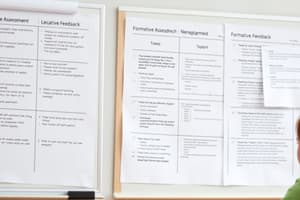Podcast
Questions and Answers
What is critical for students to effectively engage in peer and self-assessment?
What is critical for students to effectively engage in peer and self-assessment?
- Frequent assessments by external examiners
- Unstructured opportunities to reflect on their work
- Clear and transparent criteria related to learning goals (correct)
- An abundance of formative feedback from teachers
Why do students often find it difficult to engage in self and peer-assessment?
Why do students often find it difficult to engage in self and peer-assessment?
- A lack of interest in their learning outcomes
- The absence of feedback from teachers
- Too many assessment criteria provided by educators
- Insufficient training to develop awareness of their learning process (correct)
According to research, who tends to provide more acceptable feedback regarding student work?
According to research, who tends to provide more acceptable feedback regarding student work?
- Trained professionals outside the school
- Teachers with extensive experience
- Administrative staff familiar with assessment criteria
- Peers using relatable language (correct)
What does AfL stand for in the context of educational practices?
What does AfL stand for in the context of educational practices?
What role do the ideal conditions of the schools play in the research findings?
What role do the ideal conditions of the schools play in the research findings?
What is one criticism regarding the assessment methods mentioned in the research?
What is one criticism regarding the assessment methods mentioned in the research?
Which method is NOT typically associated with peer and self-assessment?
Which method is NOT typically associated with peer and self-assessment?
Which of the following approaches aims to enhance peer and self-assessment practices in students?
Which of the following approaches aims to enhance peer and self-assessment practices in students?
How does the concept of jigsawing contribute to assessment practices?
How does the concept of jigsawing contribute to assessment practices?
What aspect of classroom practice is emphasized to improve student learning, according to various studies?
What aspect of classroom practice is emphasized to improve student learning, according to various studies?
Flashcards are hidden until you start studying
Study Notes
Expectations and Feedback Practices
- School administrators and parents may have different expectations regarding Assessment for Learning (AfL) feedback practices compared to teachers.
- Researchers observed that stakeholders did not complain about AfL feedback methods.
- Ideal research conditions may not reflect actual practice, as volunteer staff were involved, unlike typical schools.
Peer and Self-Assessment
- Peer and self-assessment are recommended for fostering student autonomy and metacognition in learning.
- Many students struggle with assessing their work against specific learning goals.
- Development of critical self-awareness regarding learning requires time, training, and clear criteria.
- Without defined criteria, students lack the foundation to evaluate their performance or that of peers.
- Peer feedback tends to be more accepted by students than teacher feedback, as peers use relatable language.
Strategies for Implementing AfL
- Research highlights various methods to facilitate self and peer assessment, including:
- Self-marking
- Paired marking
- Plenary self-evaluation
- Self-assessment journals
- Traffic-lighting
- Question setting
- Comment-only marking
- Concept mapping
- Colouring squares for goal statements
- Jigsawing
- Criticism exists regarding the absence of robust evidence supporting the effectiveness of these methods for improving student outcomes.
Theoretical and Practical Challenges
- Existing research often does not link formative, summative, and self-assessment clearly.
- A lack of theoretical precision in defining AfL creates inconsistencies in its practical application.
- Some research findings may lack generalizability due to non-representative samples, such as those focusing on students with special educational needs or in vulnerable contexts.
- Methodological issues can include insufficient control over external factors and small sample sizes leading to broad generalizations.
Studying That Suits You
Use AI to generate personalized quizzes and flashcards to suit your learning preferences.




